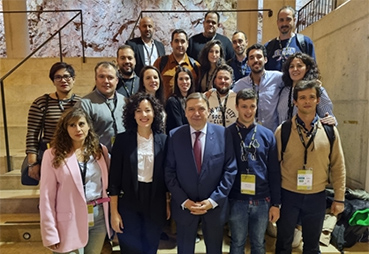On the occasion of the Spanish Presidency of the EU, COGECA and Agro-food Cooperatives of Spain held the Business Forum ‘Fostering the Future of Farming: The Importance of Cooperatives in Cultivating Our New Generation of Young Farmers’ in Tarragona, Spain, on November 9 and 10.
More than 250 young farmers and ranchers from different countries of the European Union shared in this Forum their vision of the sector, as well as their demands to guarantee the future of their profession, respond to consumer expectations and ensure the proper functioning of the food chain.
Among other notable guests, the event was attended by the Spanish Minister Luis Planas, President of the EU Agriculture and Fisheries Council, and Maciej Golubiewski, Chief of Staff of the Commissioner for Agriculture, along with Ramón Armengol, President of COGECA, and Ángel Villafranca, president of Agro-food Cooperatives of Spain.
Without young people and without cooperatives there is no future
In his opening speech, Christian Høegh-Andersen, vice president of Cogeca and coordinator of the Business Forums, recalled that “in the face of the overwhelming challenge of generational change, we must recognize that the future of European agriculture and livestock farming is linked to the future of young people. If we bet on cooperatives and make the most of their potential, we can guarantee generational change and ensure a sustainable future in the agricultural sector.”
In the same sense, Minister Luis Planas indicated that one of the policy priorities in Spain and in the EU is to promote generational change. Together with gender equality, digitalization and innovation, they are fundamental pillars to revitalize the rural environment.
The minister was convinced that the agri-food cooperative system offers many future opportunities to young Europeans, “since it is a very competitive sector, which has a cutting-edge vocation when it comes to incorporating innovations in its production processes, a great linkage with environmental and healthy lifestyle aspects, and contributes to global food security.” To promote generational change, the minister also stressed the need for young people to receive a fair and decent income for their work.
Debates and experiences
On the first day of the Forum, after an exchange of views on the challenges faced by young people in this sector, representatives of several European agricultural cooperatives presented their experiences and concrete examples of the strategies adopted to respond effectively to the needs of its members, and to increase the participation of young farmers and ranchers in agricultural activity and in the governing bodies of the cooperatives.
The second day, Friday, November 10, the participants visited the Arrossaires del Delta de l’Ebre rice cooperative, a society with more than 150 years of history and almost 2,000 members dedicated to rice cultivation.
In his speech, the president of COGECA, Ramón Armengol, expressed his gratitude and optimism for the future of European agriculture. He highlighted the importance of cooperatives that already support young farmers, emphasizing the need to further enhance their role as future leaders of agriculture.
Armengol also announced the forthcoming publication of the Tarragona Manifesto, a set of collective objectives focusing on how cooperatives can support new farmers. The manifesto, which is due to be published in the coming months, will outline key objectives for supporting the professional development of young farmers, providing financial support for their projects and encouraging their participation in cooperative governance.







